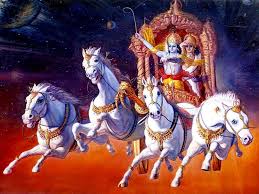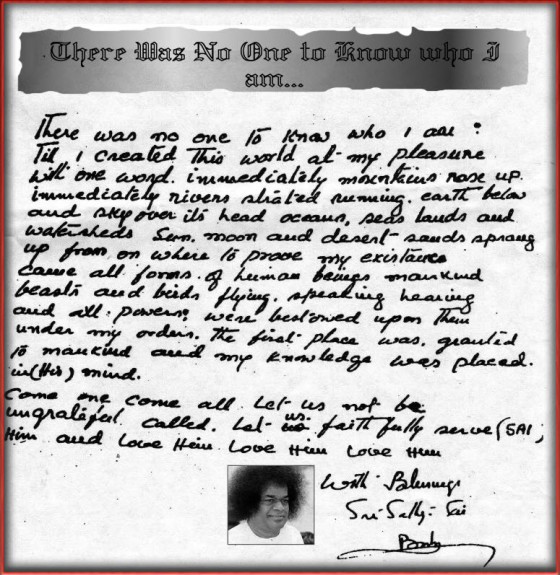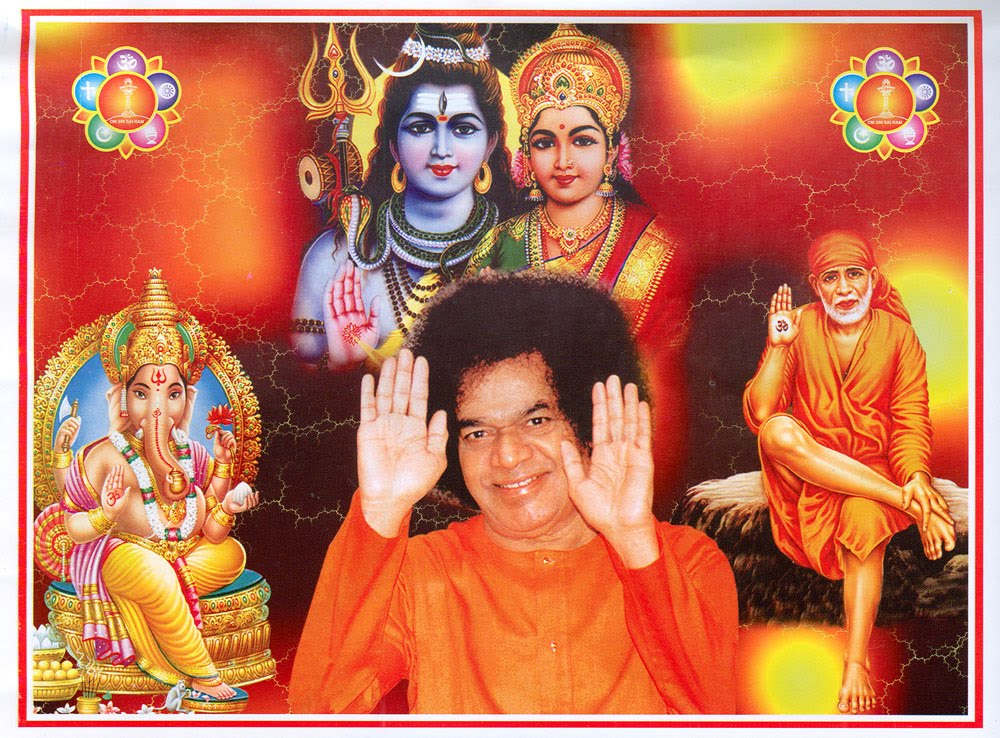On Shivaratri day in 1958 the monthly magazine designed to communicate the message of Bhagavan to the world was inaugurated. He named it Sanathana Sarathi. These two words taken together spell the function that Baba has taken upon Himself. Sanathana denotes His being the very source of all this 'becoming'. In a written message to Shri. R.R. Chatterji of the Sathya Sai Seva Samithi, Calcutta, announcing the mission for which He has assumed this human form, Baba made a declaration which nobody since the days of Lord Krishna had the good fortune to listen to:
"There was no one to know who I am till I created the world, at My pleasure, with one word. Immediately earth and sky were formed, mountains rose up, rivers started flowing, sun, moon and stars sprang out of nowhere to prove My existence. Came all forms of life - plants, insects, beasts, birds and men. Various powers were bestowed upon them under My orders. The first place was granted to man, and My knowledge was placed in man's mind."
Sanathana means 'timeless, eternal'. Baba has said that He always was, is, and ever will be. He is Sanathana, not limited in time and space, so that He can be availed of by us any time any where. The Upanishads speak of embodied beings as chariots which are drawn along by the senses (horses) through the objective world. Safety lies in choosing a knowledgeable Sarathi (charioteer) and installing him with unimpeded authority in the chariot. - Sathyam Sivam Sundaram IV

Chariot Analogy From Katha Upanishad
Know that the Atman is the rider in the chariot,
and the body is the chariot,
Know that the Buddhi (intelligence, ability to reason) is the charioteer, and Manas (mind) is the reins.
The senses are called the horses,
the objects of the senses are their paths,
Formed out of the union of the Atman, the senses and the mind, him they call the "enjoyer".
By taking upon Himself the role of the Sanathana Sarathi, Baba has revealed that He is the eternal Inner Motivator in all-recognized or unrecognized, acknowledged or ignored, respected or slandered. "My knowledge was placed in man's mind," He says. But the mind allows itself to be covered by veils, so that pure knowledge becomes warped or is denied. In the Bhagavad Gita, Arjuna asks Krishna about the mind: Chancalam hi manah Krishna pramadi balavadrudham, meaning 'Oh! Krishna, the mind is so fickle. How can it be controlled?' Krishna says in another verse: Abhyasa yogena tato mamicchaptum Dhananjaya; meaning, through practice, the vacillation of this mind can be controlled. The word 'shad' represents the control of the vacillation of the mind.
Body is like a water bubble. Mind is like a mad monkey. Don't follow the body, don't follow the mind. Follow the conscience. Your conscience is your witness.
There is this story in the Mahabharata when Arjuna accepts whatever Krishna says regarding the bird sitting on the tree. Krishna asks Arjuna, "Don't you have your own discrimination? You say it is a pigeon, and then change it to a crow when I say it." Arjuna says, "O! Krishna, I have more faith in your words than in my own wisdom."

divine sankalpa
On one occasion Swami sang another poem which had spontaneously blossomed on His lips:
"Why does the sun rise and set everyday without delay or disruption? Why do the stars that light the sky to the delight of all eyes, hide their splendorous faces when the day dawns, and never even slyly peer to tell us where they are? Why does air always be around, giving us the breath of life? Why do these streams and rivers roar, murmur, gurgle and gossip over rock, pebble and sand, as they meander along towards the parent sea? How is it that the billions that constitute mankind, though they are caskets treasuring images of the same entity, remain distinct from each other in appearance, achievement, aspiration and attitude? This is the answer: Know that I am the One who has ordained that these be such and shall behave so."
From the Form to the Formless
"You commence your journey from the stage of dualism and finally end up in the stage of non-dualism. You start your spiritual practice with the very ordinary type of devotion, worshipping God with form and attributes and using rituals and external forms of worship. But then you quickly progress onto the formless, the absolute aspect of the Divinity. In this way, you initially develop yourself spiritually by being a servant of God, but eventually you become fully identified with God.
Consider, for a moment, a very big circle, and consider that just by its side and separate from it there is another circle, one which is very much smaller. The big circle may be thought of as God, the small one as the individual soul. Here the individual is different and distinct from God; this is dualism. When you bring the smaller circle in so that it lies within the bigger circle, you have qualified non-dualism; now the individual is part of the Divinity, he exists in God. What then is the meaning of the individual becoming totally merged in God? The small circle has to broaden itself and grow bigger and bigger until it has fully expanded to the size of the big circle. At that point the two circles are indistinguishable and man has merged himself into God. This is complete non-dualism." - Sai Gita Compiled and edited by Al Drucker
"God is formless and attributeless, but He also assumes a form with attributes. There is sakara (with form) in nirakara (formless) and nirakara in sakara. Likewise, there is saguna (attributes) in nirguna (attributeless) and viceversa. A block of ice has a form, but it is not different from water. There can be no ice without water. When drops of water freeze, they form ice. The difference between sakara and nirakara is the same as the difference between ice and water." - From Bhagavan's Discourse in Sai Kulwant Hall, Prasanthi Nilayam on 17 July 1996
"You cannot discard Name and Form until you transmute yourself into the Nameless and Formless; just as the fish needed water and could not come up into the atmosphere, so long as they did not transmute themselves into land animals, giving up their aquatic nature. That is the reason why the Nameless and Formless has often to assume Name and Form, and come before humanity with limitations imposed by its own Will, so that it may be loved, respected, worshipped, listened to and followed; so that the purpose of humanity may be fulfilled." - From Bhagawan's Discourse on 4th March 1962
Hope you enjoyed the article. Om Sri Sairam























No hay comentarios :
Publicar un comentario